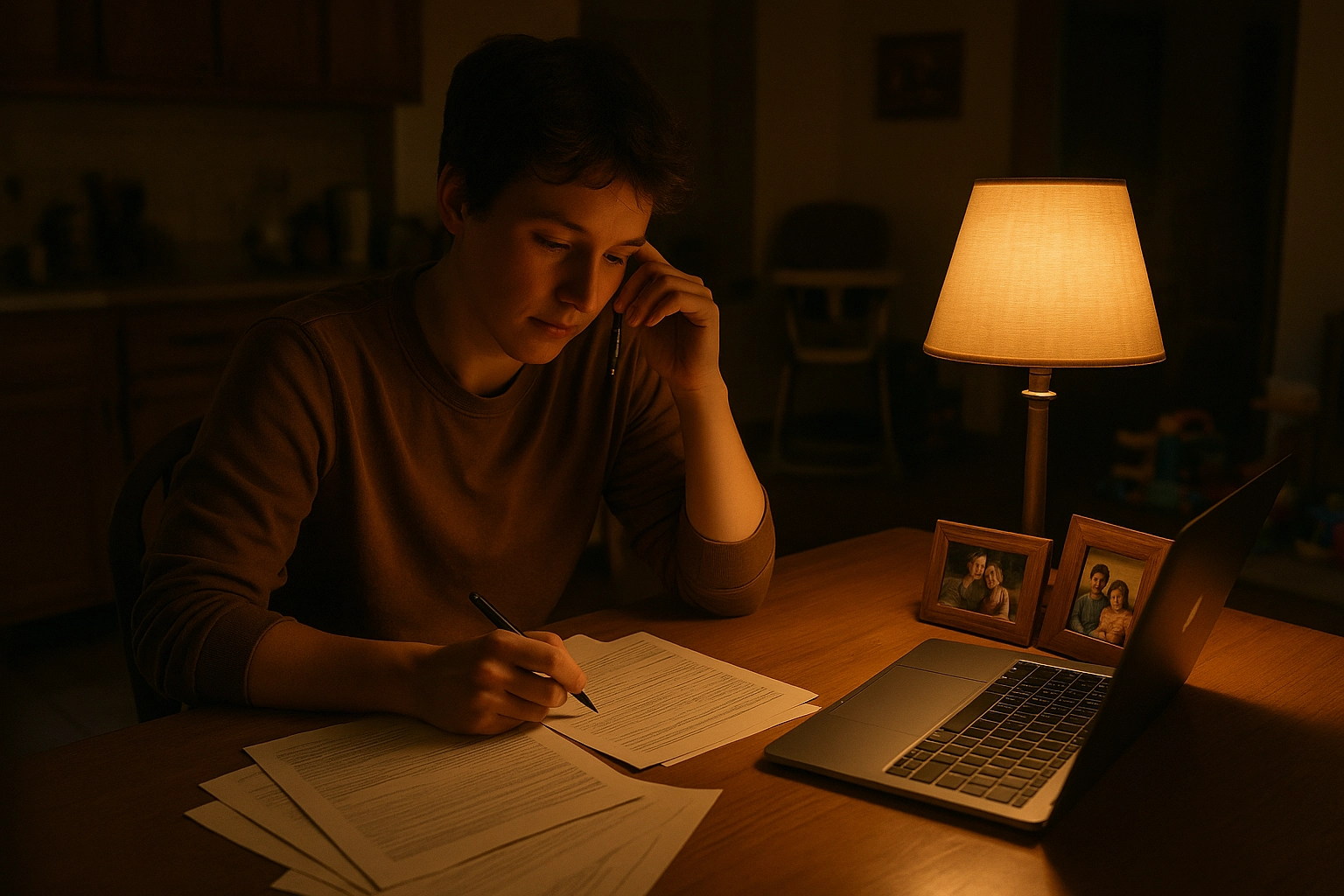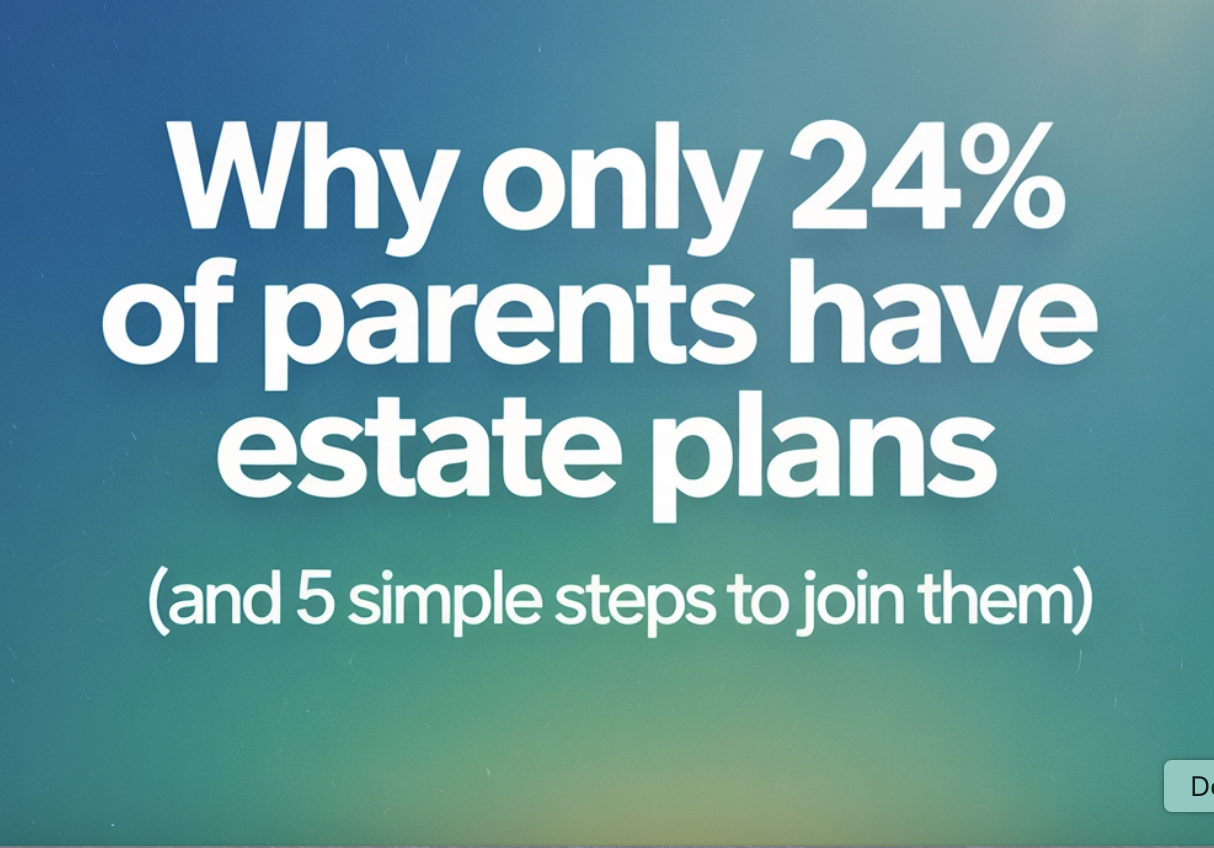Here’s a statistic that might shock you: only 24% of young parents have an estate plan in place. Even more surprising? While 36% of parents with minor children have a will, that still means nearly two-thirds of parents are leaving their children’s future entirely up to chance.
As a parent, you’d do anything to protect your kids. You buckle them into car seats, childproof your home, and probably lose sleep worrying about their safety. But when it comes to the most important protection you can give them – ensuring they’re cared for if something happens to you – most parents simply haven’t taken action.
The question isn’t whether you love your children enough to protect them. Of course you do. The real question is: what’s stopping you from joining the small group of parents who’ve already secured their family’s future?
The Real Reason Most Parents Don’t Have Estate Plans
Let me tell you something that might surprise you: it’s not because parents don’t care. In fact, 62% of parents say protecting their loved ones is their top priority. So what’s the disconnect?
The biggest culprit? Pure procrastination. Over one-third of parents admit they simply “haven’t gotten around to it.” Sound familiar?
Think about it – who has time to think about estate planning when you’re juggling soccer practice, homework help, and trying to keep goldfish crackers from taking over your car? Life with kids is beautifully chaotic, and planning for the “what-ifs” often gets pushed to tomorrow’s to-do list.
But here’s what many parents don’t realize: you don’t need to be wealthy to need estate planning. The moment you became a parent, you became responsible for someone who can’t take care of themselves. And without proper planning, you’re leaving the most important decisions about your child’s life in the hands of strangers.

What Happens When Parents Don’t Plan
Let’s talk about what actually happens when loving parents don’t have estate plans in place. Trust me, you never want your family to experience this:
Your children could end up with the wrong people. Without clear instructions, the court decides who raises your kids. This might not be the person you’d choose, and it definitely won’t happen quickly. Your children could spend months in temporary care while lawyers and judges figure things out.
Your family’s money gets tied up. Without proper planning, your assets can be frozen in probate for months or even years. Meanwhile, your children’s caregivers are trying to figure out how to pay for school clothes, medical bills, and all those little expenses that add up when you’re raising someone else’s kids.
Your 18-year-old gets a big check. Here’s something that keeps estate planning attorneys up at night: if you don’t plan properly, your child could receive their entire inheritance the day they turn 18. Can you imagine your teenager suddenly having access to hundreds of thousands of dollars? Most adults aren’t equipped to handle that kind of financial responsibility, let alone a high school senior.
Important decisions get made by strangers. From medical choices to educational decisions, people who don’t know your values or your children will be making choices that shape their future.
The 5 Simple Steps That Change Everything
Here’s the good news: joining the 24% of parents who have protected their families is easier than you think. You don’t need to become a legal expert or spend months researching. You just need to take these five straightforward steps:
Step 1: Choose a Guardian for Your Children
This is the big one – the decision that matters most. Who would you want raising your children if you couldn’t?
Don’t just think about who loves your kids (hopefully that’s a long list). Think about who:
- Shares your values and parenting style
- Has the emotional bandwidth for more children
- Is financially stable enough to provide for your kids
- Actually wants this responsibility
Have the conversation with your chosen guardian before you make it official. Yes, it’s awkward. Yes, it’s emotional. But it’s also one of the most loving things you can do for your children.
Pro tip: Choose a backup guardian too. Life changes, and you want to make sure your children always have a clear plan in place.
Step 2: Create Your Will
Your will is where you make your wishes official. This document tells the world:
- Who should care for your children
- How you want your assets distributed
- Who should handle your affairs
Without a will, you’re essentially letting state law and strangers make these deeply personal decisions for your family. Don’t leave your children’s future up to a government flowchart.

Step 3: Set Up a Trust for Your Children
Here’s where you get smart about protecting your kids’ inheritance. A trust lets you:
- Control when your children receive money (spoiler alert: probably not at 18)
- Set conditions for distributions (like completing college or reaching certain ages)
- Avoid probate so your family gets help immediately
- Protect assets from potential creditors or divorces down the road
Think of a trust as your parenting from beyond – you’re still there to guide important financial decisions even when you can’t be physically present.
Step 4: Get Adequate Life Insurance
This might be the easiest step, but it’s crucial. Life insurance ensures your children have immediate financial support if something happens to you.
Calculate what your family would actually need:
- Daily living expenses for years to come
- College tuition for each child
- Healthcare costs
- The income you won’t be there to provide
The cost of adequate life insurance is probably much less than you think – often less than your monthly coffee budget. But the security it provides your children? Priceless.
Step 5: Update Everything Regularly
Estate planning isn’t a “set it and forget it” situation. Your plan needs to grow with your family. Review and update your documents when:
- You have more children
- Your financial situation changes significantly
- You move to a different state
- Your chosen guardians’ circumstances change
- Your children reach major milestones
Set a reminder in your phone right now to review your estate plan every three years. Your future self (and your children) will thank you. (For our clients, we have it calendared to reach out to them every 3 years.)
You’re Not Alone in This
Planning for the unthinkable feels overwhelming, especially when you’re already juggling everything that comes with being a parent. But here’s what I want you to remember: taking action on your estate plan is one of the most loving things you can do for your children.
You’re not planning for tragedy – you’re planning for peace of mind. You’re making sure that your love, your values, and your care for your children extend far beyond your physical presence in their lives.
The parents who’ve already completed their estate plans aren’t smarter or more organized than you. They’ve simply decided that their children’s future is too important to leave to chance. They’ve chosen to be in control instead of hoping everything works out.
Your Next Step Is Simple
Don’t be part of the 76% of parents who are leaving their children’s future up to chance. You love your kids too much for that, and deep down, you know it’s time to take action.
Your family deserves better than hoping for the best. They deserve a plan that ensures they’ll be taken care of according to your wishes, no matter what life brings.
Ready to join the parents who’ve already protected their families? The process is simpler than you think, and the peace of mind is immediate.
Call 855-965-3666 or schedule a free 15-minute call at https://personallegacylawyer.as.me/schedule/6d7ffe2d to discuss your family’s specific needs. During this call, we’ll help you understand exactly what your family needs and how to get it done quickly and affordably.
Don’t wait until it’s too late. Your children are counting on you to make the decisions that adults make – the hard ones that protect the people you love most. Visit personallegacylawyer.com to learn more about how we can help you secure your family’s future today.
Because when it comes to your children’s safety and security, hoping for the best just isn’t enough. They deserve better than that, and so do you.




